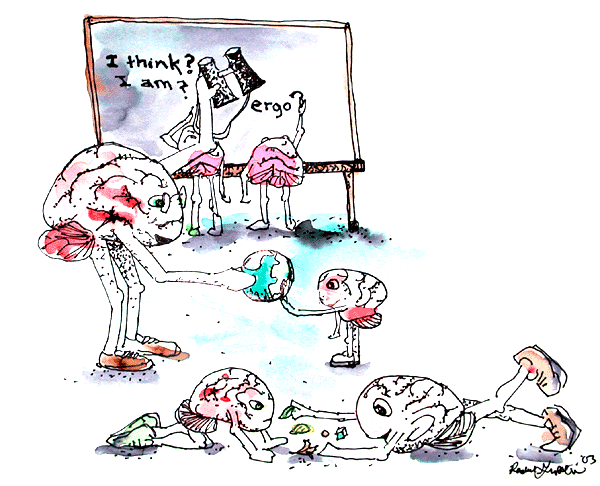Serendip is an independent site partnering with faculty at multiple colleges and universities around the world. Happy exploring!
Getting Together to Tell Stories!
Day 20 of Storytelling as Inquiry:
Getting Together to Tell Stories

II. Papers due Tuesday (Audra, Meredith to me @ 9)
you are familiar: write about your experiences
AS A PARTICIPANT-OBSERVER seen from the outside
think especially about what is KNOWN/ENACTED TACITLY in your culture:
what behaviors, rituals, etiquettes are practiced,
what understanding is shared....without explicit instruction?
III. Turn to person next to you/in other section
calypsse: Both essays took me back to my culture....in Mexico there are many stories that can be told
about a word or a phrase....in telling a story we end up telling several stories within a story...
hannahpayne:
sometimes we don't realize the distinct characteristics of the cultures that we are a part of....this is highlighted when put in comparison with other culutres....in coming to college...there are so many people from very different backgrounds...hearing their stories have pointed out certain characteristics of my own culture from home.
Allison Fink: An anthropologist is kind of like
an artist who discovers layers of meaning in the playing out of culture
that no one knew was there before.
do this for one another: tell each other what culture you are going to write about
(if you haven't selected one, help each other to pick one....)
and compare cultures: how are they like and different?
IV. Groups of four:
Leslie Silko:
knowing the stories, one is able to deal with terrible sorts of things.
If others have endured, so can we...
The stories are always bringing us together, keeping this clan together.
"Don't go away, don't isolate yourself, but come here..."
Allison Fink: Silko's...culture
makes public what other people have done because they believe that it
is important not to isolate oneself from a group by thinking that one
has experiences that are unique to oneself. One must experience the experiences of the group as one’s own. This is the way the group feels unified.
how are stories used in your culture?
what kinds of stories are told?
how are they told?
what function do they have?
V. Groups of eight:
Geertz says that the "function of a cockfight is interpretive:
it is a story the Balinese tell themselves about themselves."
christa: how we can intelligibly explain cruelty?
what story does your culture tell itself about itself?
what counts as "deep play" in your culture?
VI. Group of the Whole:
what is deep play? have you ever engaged in it?
"stakes so high that from a utilitarian standpoint,
it is irrational to engage in it @ all!"
what else did you learn from this "exponential" exercise?
VII. how do you understand the stories Silko tells?
carterian: I found the story-telling exhibited by Pueblos to be... frustrating. I wanted to know more!....I wish that I had the power to appreciate what is offered to me in these stories
ErinDoppelheuer: I have to agree with carterian in the fact that I was frustrated with the Pueblo stories because they left them open ended and I wanted to know more....what is the lesson...these stories...seemed to be left open ended, which personally annoys me.
jforde: I found the story to very odd. Why would the girl want to drown herself....A mother watching her daugher drown herself does not seem like a normal reaction.
Silko: In fact, a great deal of the story is believed to be inside the listener;
the storyteller's role is to draw the story out of the listeners.
Does this only hold true for members of the clan?
Can we all be a member of that clan?
Can we tell stories that all can understand?



